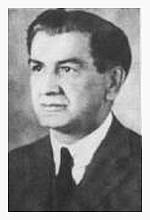Zequinha de Abreu
Zequinha de Abreu (born September 19, 1880 in Santa Rita do Passa Quatro , State of São Paulo , Brazil ; † January 22, 1935 in São Paulo ), actually José Gomes de Abreu , was a Brazilian composer and instrumentalist of choro .
Life
Zequinha de Abreu was the son of the pharmacist José Alacrino Ramiro de Abreu and Justina Gomes Leitão. He started taking music lessons at the age of 6. As instruments he played the flute , clarinet and piano . He received lessons in Santa Rita, at the Colégio São Luís von Itu and from 1894 in harmony at the Seminário Episcopal de São Paulo.
As a professional musician, he showed his talent for writing down his compositions very quickly, creating a total of over 300 works, including "Flor da Estrada" and "Bafo de Onça". His most famous composition, the choro " Tico-Tico no Fubá ", has been interpreted by many musicians, including the American organist Ethel Smith and the singer Carmen Miranda .
In later years he was a drugstore owner, mayor of Santa Rita do Passa Quatro, and piano teacher.
Honors
The city of Santa Rita still honors Zequinha today, the 53rd Festival Zequinha de Abreu took place in 2013 , it maintains the Museu Histórico Zequinha de Abreu and in 2010 inaugurated a public mural dedicated to it.
Selection of works
- Tico Tico no Fubá
- Sururú na Cidade
- Branca
- Tardes em Lindóia
Web links
- Zequinha de Abreu at CliqueMusic (Portuguese)
- Tico-Tico no Fubá - a Brazilian evergreen
- Zequinha de Abreu in the Internet Movie Database (English)
- http://www.zequinhadeabreu.com/p/home.html ; (Portuguese); Digital archive about Zequinha de Abreu with biography, catalog of works with sheet music, discography, pictures and bibliography
Individual evidence
- ^ Wall painting by Waldomiro de Freitas Sant'Anna on the website of the city prefecture. Retrieved January 31, 2014 (Portuguese).
| personal data | |
|---|---|
| SURNAME | Abreu, Zequinha de |
| ALTERNATIVE NAMES | Abreu, José Gomes de (real name) |
| BRIEF DESCRIPTION | Brazilian composer and instrumentalist |
| DATE OF BIRTH | September 19, 1880 |
| PLACE OF BIRTH | Santa Rita do Passa Quatro , Brazil |
| DATE OF DEATH | January 22, 1935 |
| Place of death | São Paulo , Brazil |
